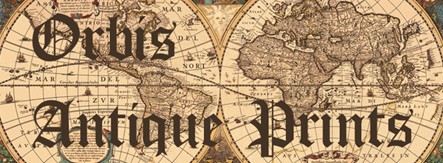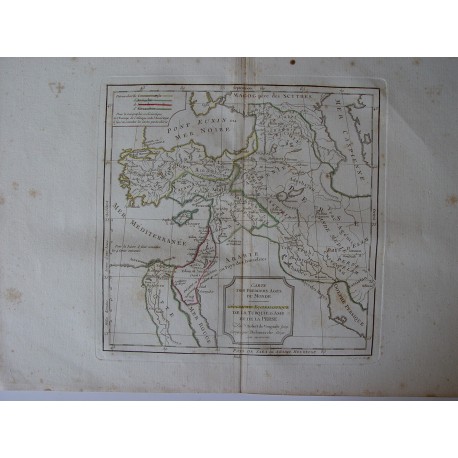Cart
0
Product
Products
(empty)
No products
To be determined
Shipping
0 €
Total
Product successfully added to your shopping cart
Quantity
Total
There are 0 items in your cart. There is 1 item in your cart.
Total products
Total shipping
To be determined
Total
Antique map of the First Ages of the World. Robert de Vaugondy.
10122
Normal (with signs of normal use)
Antique map of the First Ages of the World (Carte des Premiers Ages du Monde). Robert de Vaugondy.. An interesting map created by Robert de Vaugondy for the 'Atlas Universel' in 1757 and corrected by his successor Lamarche. The Atlas Universel is one of the most important 18th-century atlases.
More
Plate size: 26,1x29,7 cm.
Paper size: 31,8x45 cm.
Condition: Rust spots that can be seen in the image.
Gilles Robert de Vaugondy (1688-1766) and his son, Didier Robert de Vaugondy (1723-1786), formed one of the most prominent and recognized map and globe-making workshops in France in the mid-18th century. They were descendants of one of the most important cartographers of the previous century, Nicolas Sanson through his grandson Pierre Moulard-Sanson, from whom in 1730 they inherited most of the cartographic material that the Sanson dynasty had accumulated over almost a century of work, material that they completed with the one acquired from the descendants of Hubert Jaillot. With them they formed the basis with which to start his most ambitious and well-known work, the Atlas Universel (1757), one of the most beautiful atlases produced by the French school in the middle of the century. To do this, the Vaugondys, who had excellent geographic training, integrated the information obtained from the review of the oldest inherited materials with the most up-to-date maps of the moment, including new place names, the latest academic research, the diaries of contemporary explorers and missionaries. and even astronomical observation, sometimes checking and correcting the latitude and longitude of many maps from their own observations. In addition, unlike many cartographers of the time, they made an effort to indicate the sources they used to elaborate them, just as at the time such prominent cartographers as Ortelius or Mercator did. Both worked together and, sometimes, it is not possible to attribute their maps to the father or the son, since they often signed with the last name, without the initials, although in other cases the authorship can be determined by the distinctive shape of each: the father normally uses "M. Robert" and son "Robert de Vaugondy." Both received the honorary title of Geographe ordinaire du Roy, the father in 1730 and Didier in 1760. On the son's death, the cartographic workshop passed to Jean Fortin monkeys, in 1778, and later to Charles Francis Delamarche.
Reviews
No customer reviews for the moment.








